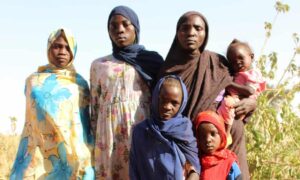
They burst into the room, yanking the boy from under a bed. His brown eyes wide open with terror, they put a gun to his temple. Two shots. Nadifa Ismail ran towards the body, but the intruders shoved the mother out of her home. Moments later, armed men set it ablaze, cremating her child’s body, destroying everything she had.
Weeks later, at 4pm on 28 February in Sudan’s Darfur region, Nadifa, her clothing streaked red with dust, passed the paramilitary group who had executed her 16-year-old son shortly after breakfast.
“Hopefully it is the last time I will see them,” she said. “They beat me too.”
Nadifa was the 212th person that day to make it through the border crossing and into the town of Adré in eastern Chad.
Like those who had gone before, the 38-year-old offered detailed testimony that fresh atrocities are happening in Darfur, a vast region in the west of Sudan.
The latest arrivals offer further evidence of ethnic cleansing in Darfur’s unfolding dystopian nightmare. Women raped in front of their children, daughters raped in front of their mothers. Boys shot in the street. Others dragged away and never seen again.
Their statements crystallise concerns that the Rapid Support Forces (RSF) – the powerful paramilitary group in Sudan that killed Nadifa’s son – along with other allied Arab militia, remain intent on completing the genocide against the Masalit community, a darker-skinned African tribe, which began 20 years ago.
Those able to share their experiences are the fortunate ones: latest accounts describe a region sealed off with innumerable checkpoints and roving RSF kill squads.
For the first seven weeks of 2024 Nadifa, a Masalit, and her surviving children, five girls, lived on the run, sheltering in abandoned homes, once a derelict school, dodging the militias.
They escaped as Sudan’s civil war nears its first anniversary next month, a conflict only intensifying as foreign powers wrestle for influence within the strategic African nation.
But Nadifa has merely swapped one hellish existence for another. Her family made it to Chad at the same time as the world turned its back.
International aid has collapsed. Global leadership, long conspicuous by its absence, has drained to nothing. Taken as a whole, the response raises questions over the viability of the international humanitarian system.
But senior UN officials also warn that the “abandonment” of Chad poses profound challenges, not only for Africa but soon also for Europe.
